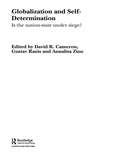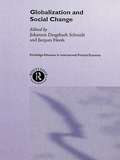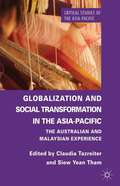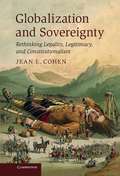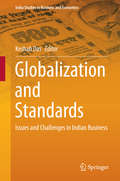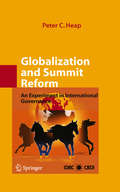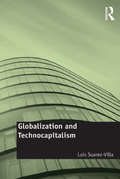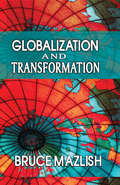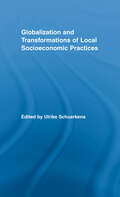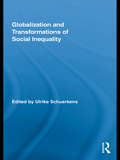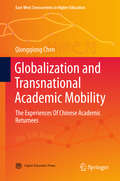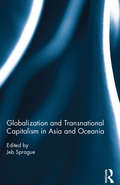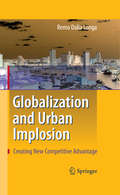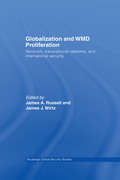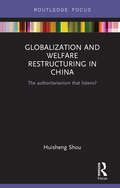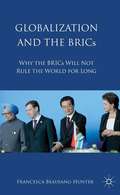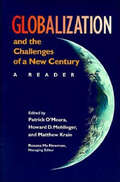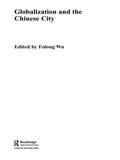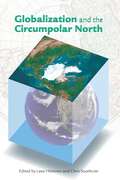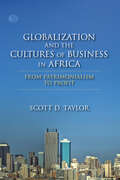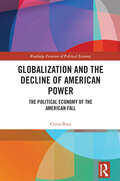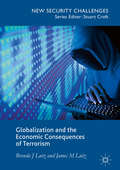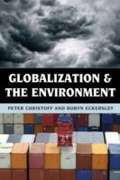- Table View
- List View
Globalization and Self-Determination: Is the Nation-State Under Siege? (Routledge Studies in the Modern World Economy #Vol. 58)
by Gustav Ranis David R. Cameron Annalisa ZinnIs the nation state under siege? A common answer is that globalization poses two fundamental threats to state sovereignty. The first concerns the unleashing of centrifugal and centripetal forces - such as increasing market integration and the activities of institutions like the IMF, World Bank, and WTO - that imperil state sovereignty from 'outside' the nation state. The second threat emanates from self-determination movements that jeopardize state sovereignty from 'inside'. Rigorously analyzing popular hypotheses on globalization's effect on state sovereignty from a broad social sciences perspective, the authors use empirical evidence to suggest that globalization's multilevel threats to state sovereignty have been overestimated. In most instances globalization is likely to generate pressure for increased government spending while only one form of market integration - foreign direct investment by multinational enterprises - appears to increase any feeling of economic insecurity. This volume will be invaluable to course instructors at both graduate and undergraduate levels, policy makers and members of the general public who are concerned about the effects of globalization on the nation-state.
Globalization and Social Change: People And Places In A Divided World (Routledge Advances in International Political Economy #Vol. 6)
by Johannes Dragsbaek Schmidt Jacques HershGlobalization and Social Change challenges conventional thinking regarding the inevitability of globalization. Rather than seeing globalization as 'the end station of capitalism', it presents the development of this phenomenon as a disruptive and conflicting process.
Globalization and Social Transformation in the Asia-Pacific: The Australian and Malaysian Experience (Critical Studies of the Asia Pacific Series)
by Claudia Tazreiter Siew Yean ThamGlobalization and Social Transformation in the Asia-Pacific The Australian and Malaysian Experience by Claudia Tazreiter, Siew Yean Tham
Globalization and Sovereignty
by Jean L. CohenSovereignty and the sovereign state are often seen as anachronisms; Globalization and Sovereignty challenges this view. Jean L. Cohen analyzes the new sovereignty regime emergent since the 1990s evidenced by the discourses and practice of human rights, humanitarian intervention, transformative occupation, and the UN targeted sanctions regime that blacklists alleged terrorists. Presenting a systematic theory of sovereignty and its transformation in international law and politics, Cohen argues for the continued importance of sovereign equality. She offers a theory of a dualistic world order comprised of an international society of states, and a global political community in which human rights and global governance institutions affect the law, policies, and political culture of sovereign states. She advocates the constitutionalization of these institutions, within the framework of constitutional pluralism. This book will appeal to students of international political theory and law, political scientists, sociologists, legal historians, and theorists of constitutionalism.
Globalization and Standards
by Keshab DasThe changes following more than two decades of economic reforms and globalization of the Indian economy - at state, corporate sector, and consumer level - raise interesting questions on the ways in which the stakeholders will continue to engage on the world stage, politically, socially and economically. One key feature of global trade over this period has been the growing importance of not only product standards but, importantly, labor, environmental, food safety and social standards. Being essentially a non-tariff barrier,standards have often become critical to market access and essential to sustained competitiveness. This has a clear impact on the manner in which both global and Indian business is conducted now and in the future. It also underlines the need for a new area of enquiry that addresses the following questions: How are the Indian public and private actors - the state, domestic firms, local consumers and society - influencing and being influenced by such standards? Do standards really matter in an overwhelmingly informal production sphere, with consumers deeply segmented on the basis of a highly skewed distribution of income and with the rural population becoming further marginalized? We have limited knowledge about the challenges faced and strategies pursued by these key domestic actors, both public and private. How have they been able to drive these processes and what are their implications for larger concerns with inequalities and the conditions of the poor? How does the omnipresent informality influence compliance, encourage multiple standards and affect the chances of addressing institutional dysfunctionality? What role does regulation play? These are some of the issues dealt with in the book, which has chapters focusing on aspects of specific sectors such as microfinance, pharmaceuticals, automobiles, tea trading, the role of the state and changing consumer influence. We have limited knowledge about the challenges faced and strategies pursued by these key domestic actors, both public and private. How have been they able to drive these processes and what are the consequences of these changes for the Indian economy, other emergent economies and for the rest of the developing world? In particular, what are their implications for the wider Indian society, especially on concerns with informality, inequalities and the conditions of the poor? How does informality in its omnipresent form influence compliance, encourage multiple standards and chances of addressing institutional dysfunctionality? What role does regulation play? These are some of the issues dealt within the book wherein chapters focus on aspects of specific sectors, trading, role of the state and changing influence of the consumer.
Globalization and Summit Reform
by P. Martin G. Smith Peter C. HeapThis account of the 'L-20 project' describes and analyses a 3-year mobilization designed as an alternative to the political deadlocks preventing progress on critical global issues. The book traces the origins and findings of the project, and addresses such hot button issues as global warming, poverty, and war in the developing world. The book features a Foreword by Dr. Gordon Smith, and an Afterword by the Right Honourable Paul Martin, former Prime Minister of Canada.
Globalization and Technocapitalism: The Political Economy of Corporate Power and Technological Domination
by Luis Suarez-VillaGlobalization and Technocapitalism considers the global reach of a new capitalist era, exploring the nature of 'technocapitalism' as grounded in new forms of accumulation, commodification, and corporate organization. As technological creativity, corporate research, and talent flows become more important than ever, this book explores the manner in which globalization acquires new contextual features that will become central to the macro-social dynamics of the twenty-first century. It thus sheds light on the resultant growth in global inequalities and more intrusive forms of global domination that are grounded in emerging sectors, such as nanotechnology, biotechnology and its diverse fields, such as genomics, synthetic bioengineering, bioinformatics and biopharmacology, and related advances in computing and telecommunications. A rigorous examination of developments in contemporary capitalism as driven by the forces of globalization, Globalization and Technocapitalism will be of interest to scholars working in the fields of social and political theory, international political economy, political philosophy, science and technology studies and globalization.
Globalization and Transformation
by Bruce MazlishIn Globalization and Transformation, Bruce Mazlish examines developments in contemporary warfare, economy, technology, and religion as fundamental factors in human experience that have accelerated global change in recent years. Continuing the analysis he began in Reflections on the Modern and the Global, Mazlish delves into human history, examining who we were so as to help us understand who we are today.Early in the volume, Mazlish highlights the British historian Geoffrey Barraclough, who foresaw the trajectory of world events that gave rise to the "New Global History." He also examines humanity's progress, reminding us of contemporary globalization's precursors: the theories of Charles Darwin; the concept of the global and the local coupled with inquiry into the concept of parts and wholes; merchant empires, such as the English and Dutch East India companies that crisscrossed the ocean in pursuit of profits and power; anti-globalization; and the linkage of globalization to the very concept of humanity.Though globalization is a complex concept, and versatile in its applications, Mazlish focuses on its transformational characteristics, noting that globalization's impact is not uniform across society's culture, politics, or economics. Some parts of the world have yet to accept the challenge to their past traditions. These stimulating essays offer new insights into a major phenomenon of our time.
Globalization and Transformations of Local Socioeconomic Practices (Routledge Advances in Sociology)
by Ulrike SchuerkensThis innovative volume provides a comprehensive overview of the transformation of socio-economic practices in the global economy. The contributors offer analytical and comparative insights at the world level, with regard to the current socio-economic practices as well as an assessment of the overall economic globalization phenomenon in the global world. Through empirical case studies of different civilizations or cultures that describe situations of intertwining of local socio-economic practices and global economic modernity, this volume assesses the overall situation in the world, looking at the world as an economic system where some countries act as winners, others as losers and some as both winners and losers of economic globalization. This exceptional book will appeal to sociologists, social and cultural anthropologists, and economists interested in development.
Globalization and Transformations of Social Inequality (Routledge Advances in Sociology)
by Ulrike SchuerkensSocial inequality is a worldwide phenomenon. Globalization has exacerbated and alleviated inequality over the past twenty-five years. This volume offers analytical and comparative insights from current case studies of social inequality in more than ten countries within all the major regions of the world. Contributors provide an assessment of the overall social globalization phenomenon in the global world as well as an outlook of transformations of global social inequality in the future. This book will be a timely addition for students and scholars of globalization studies, social inequality, sociology, and cultural and social anthropology.
Globalization and Transnational Academic Mobility
by Qiongqiong ChenThis book examines the way Chinese academics returning from the US re-establish their academic identities and professional practices at China's research universities in the context of higher education internationalization in China. It goes beyond economic accounts of academic mobility based on the notions of brain drain, brain gain, and brain circulation. Instead, it uses a cultural approach to explore the everyday experiences of the returning scholars concerning the issues of their sense of identity, as well as their ways of connecting and bringing about changes in their work communities. It will appeal anyone interested in 1) globalization and academic mobility; 2) China's talent policies and strategies; and 3) the internationalization of Chinese universities.
Globalization and Transnational Capitalism in Asia and Oceania
by Jeb SpragueNews headlines warn of rivalries and competing nations across Asia and the Pacific, even as powerful new cross-border relations form as never before. This book looks behind the Asia-Pacific curtain: at the new forms of social, economic, and political integration taking place through a global capitalism that is rife with contradictions, inequality, and crisis. We are moved beyond traditional conceptualizations of the inter-state system with its nation-state competition as the core organizing principle of world capitalism and the principal institutional framework that shapes the makeup of global social forces. These important studies examine and debate over how there is a growing transnationality of material (economic) relations in the global era, as well as an emerging transnationality of many social and class relations. How does transnational capitalist class fractions, new middle strata, and labor undergird globalization in Asia and Oceania? How have states and institutions become entwined with such processes? This book provides insight into a field of dynamic change.
Globalization and Urban Implosion
by Remo Dalla Longa Veronica Vecchi Elisa Ricciuti Bryn JonesIn the past twenty years, globalization has rendered many economic and social urban functions obsolete. Large cities face a form of implosion, which necessitates a rethinking of both contents and containers. This book will mainly concentrate on the latter aspect. Thus, the need to replace old functions with new ones is clear, especially within complex urban areas where the connections between public and private assets are strongest. In this context, new forms of urban models, Public Private Partnerships, tools and "drivers" - various decision makers who have to operate within complex urban areas - have to be considered. Hence, the creation or destruction of values depends on how new functions replace old ones. This also explains new and important forms of competitive advantage, among large globalized cities. This book presents a model of complex urban interventions. Based on a literature review, the model integrates different forms of Public Private Partnerships (PPPs), new tools and instruments associated with governance (issues/challenges), and new profiles of public drivers. By analyzing a number of European urban centers, this book illustrates the implementation of the general model in specific case studies and, furthermore, shows the essential differences between post-socialist and Western cities.
Globalization and WMD Proliferation: Terrorism, Transnational Networks and International Security (Routledge Global Security Studies #Vol. 4)
by James J. Wirtz James A. RussellThis edited volume explores the relationship between the accelerating process of globalization and the proliferation of Weapons of Mass Destruction, which is increasingly seen as the pre-eminent threat to international security. The proliferation of Weapons of Mass Destruction has traditionally been seen as a function of the 'security dilemma' in the state-based international system. But the advent of the nuclear supply network pieced together by the Pakistani scientist A. Q. Khan represented a departure from this model, involving a variety of organizations not directly connected to a state. This volume assembles an international group of experts in order to assess the relationship between proliferation and globalization to ascertain how contemporary communication, transportation and financial networks are facilitating or constraining trade in dangerous contraband. The book ultimately seeks to determine whether globalization is fundamentally altering the nature of the proliferation problem, particularly the threat that Weapons of Mass Destruction might fall into the hands of terrorists. This book will be of much interest to students of nuclear proliferation, international security, terrorism and IR in general.
Globalization and Welfare Restructuring in China: The Authoritarianism That Listens? (Routledge Contemporary China Series)
by Huisheng ShouIn the past few decades, the change in China’s welfare system has been characterised by a balanced distribution of benefits across social sectors and the institutionalization of welfare redistribution. This process has occurred without significant political change that would empower politically disadvantaged groups such as the urban and rural poor. This book questions what has motivated the regime to redistribute welfare benefits through an institutionalized manner whilst its political structure remains largely unchanged. By situating China within the broader context of East Asia and against the backdrop of globalization since the 1980s, this book examines the institutional origin and development of China’s new welfare system. Through doing this, it provides an understanding of the nature of the Chinese state in dealing with its economy and society in a context of global economic integration. A global-local dynamics framework highlights the importance of the interactive relationship between China’s integration into the world economy and its unique geopolitical constraints, which together induce the regime to listen to its subjects and follow a "move to the middle" in welfare restructuring. Offering a novel explanation of the welfare-globalization relations in a non-democratic setting, this book will be of interest to students and scholars of Social Policy, International Political Economy and Chinese Politics.
Globalization and the BRICs: Extending The Cognitive Science Of Religion (Palgrave Frontiers In Philosophy Of Religion Ser.)
by Francesca BeausangAs the Eurozone faces an uncertain future and Obama struggles to demonstrate that America still has a superpower status, this book challenges the widespread perception that Brazil, Russia, India and China are becoming global economic and political powers, instead forecasting a decline rooted in excessive inequality and insufficient innovation.
Globalization and the Challenge of a New Century
by Patrick O'Meara Howard Mehlinger Matthew KrainThis book focuses on globalization while at the same time reaffirming the importance of the area concept
Globalization and the Challenges of a New Century: A Reader
by Patrick O’Meara, Howard D. Mehlinger and Matthew Krain"If you want to catch up on some of the best articles written about globalisation since the topic became fashionable several years ago, this reader is the place to start." —The Economist A blue ribbon collection of major articles and position papers on the concept of globalization. By bringing together a number of major thinkers and different perspectives, this book provides a broad introduction to the topic and lays the groundwork for an interdisciplinary collaborative dialogue. Contributors include Kofi Annan, Benjamin Barber, Francis Fukuyama, Samuel Huntington, Robert Kaplan, Paul Kennedy, Walter Lacqueur, Bill McKibben, Lester Thurow, and Jeffrey Sachs.
Globalization and the Chinese City (Routledge Contemporary China Series #Vol. 7)
by Fulong WuIntroducing readers to the far-reaching global orientation that is now taking place in urban China, an international team of contributors describe overarching globalization through a detailed examination of the transformation of the built environment. A range of urban development processes are analyzed including urbanization, real estate development, changing landscapes, the industrial restructuring of the second-tier city, and the formation of the city-region in the context of global and local interactions. In examining city development and local practices as part of globalization processes, the global city is treated as a collection of microcosms and concrete places, overcoming the analytical tension of the dichotomy of the perceived 'East versus West' divide.
Globalization and the Circumpolar North
by Heininen, Lassi; Southcott, ChrisThe circumpolar north has long been the subject of conflicting national aspirations and border disputes, and with the end of the cold war and the coming era of potential resource scarcity, its importance will only grow over the next several decades. Anticipating that renewed prominence, Globalization and the Circumpolar North brings together an array of scholars to explore the effects of this increased attention, from the new opportunities offered by globalization to the potential damage to long-isolated northern communities and peoples.
Globalization and the Cultures of Business in Africa: From Patrimonialism to Profit
by Scott D. TaylorCan Africa develop businesses beyond the extractive or agricultural sectors? What would it take for Africa to play a major role in global business? By focusing on recent changes, Scott D. Taylor demonstrates how Africa's business culture is marked by an unprecedented receptivity to private enterprise. Challenging persistent stereotypes about crony capitalism and the lack of development, Taylor reveals a long and dynamic history of business in Africa. He shows how a hospitable climate for business has been spurred by institutional change, globalization, and political and economic reform. Taylor encourages a broader understanding of the mosaic of African business and the diversity of influences and cultures that shape it.
Globalization and the Decline of American Power: The Political Economy of the American Fall (Routledge Frontiers of Political Economy)
by Cyrus BinaThis book explores America’s decline as a global power, arguing that the implosion of Pax Americana was initiated by the process of globalization, preceding the collapse of the Soviet Union by nearly a decade. The era of Pax Americana, and with it American hegemony, is conclusively passed, and will not return in current global conditions. There is a stark contrast between the present epoch and the postwar era of American hegemony (1945–1979) in which the United States, at least outside of the Soviet sphere of influence, largely managed the international economy and reigned over international politics and relations. Drawing on both theoretical and empirical evidence, this book shows that the era of globalization unleashed forces—social, political, and economic—which broke down the status quo of American hegemony. Author Cyrus Bina also establishes that since the Iranian Revolution (1979), US involvement throughout the Middle East, in Iraq, Afghanistan, Libya, Syria, Yemen, and now notably in Ukraine has been motivated by the freefall of American hegemony and an attempt to get it back by direct or indirect military force. Bina utilizes these contexts for wider analysis and critique of a number of theories commonly used to analyze economy, polity, geopolitical, and dynamics of crisis and social change in capitalism. This book will be of great interest to students, academics, and policymakers on subjects of Economics, International Relations, Global Studies, International Political Economy, Political Geography, Sociology, and postwar History.
Globalization and the Distribution of Wealth
by Arie M. KacowiczThe effects of globalization on poverty and inequality are a key issue in contemporary international politics, yet they have been neglected in international relations and comparative politics literatures. Arie M. Kacowicz explores the complex relationships between globalization and the distribution of wealth as a political problem in international relations, analyzing them through the prism of poverty and inequality. He develops a political framework (an 'intermestic model') which captures the interaction between the international and the domestic domains and explains those effects with a particular emphasis upon the state and its relations with society. He also specifies the different hypotheses about the possible links between globalization and the distribution of wealth and tests them in the context of Latin America during the years 1982–2008, with a particular focus on Argentina and the deep crisis it experienced in 2001–2.
Globalization and the Economic Consequences of Terrorism (New Security Challenges)
by Brenda J. Lutz James M. LutzThis book analyzes the effects of economic, social, and political disruptions that have come with integration into the global economy for countries in five different regions and the developing world as a whole. One consequence of such disruptions is increased levels of terrorism in many countries. In addition, the effects of terrorism on economic activities were measured. Although the patterns vary for the regions, there is no doubt that connections exist. Political links with outside countries have mitigated some of the negative consequences of entering into greater contact with other countries. There is less evidence that the increased terrorism from these disruptions has had negative effects on foreign investment and tourism. This volume will provide essential materials for researchers and students interested in the connections between globalization and terrorism and between terrorism and accompanying negative economic consequences.
Globalization and the Environment
by Robyn Eckersley Peter ChristoffThis book by two leading scholars offers the first systematic analysis of the relationship between globalization and the environment from the early Modern period to the present. Peter Christoff and Robyn Eckersley develop a broad conceptual framework for understanding the globalization of environmental problems and the highly uneven, often faltering, international political response. The authors develop linkages between economic globalization and environmental degradation and explore a range of key global environmental problems focusing on the two most challenging of all: climate change and biodiversity loss. Finally, they critically explore the challenges of environmental governance in a world defined by global capitalism and sovereign states. Providing a normative framework for evaluating global environmental governance, they suggest alternative institutional and policy responses. Through a rich set of case studies, this powerful book will help readers grasp the systemic causes of global environmental degradation as well as the myriad opportunities for reform of global environmental governance. "
